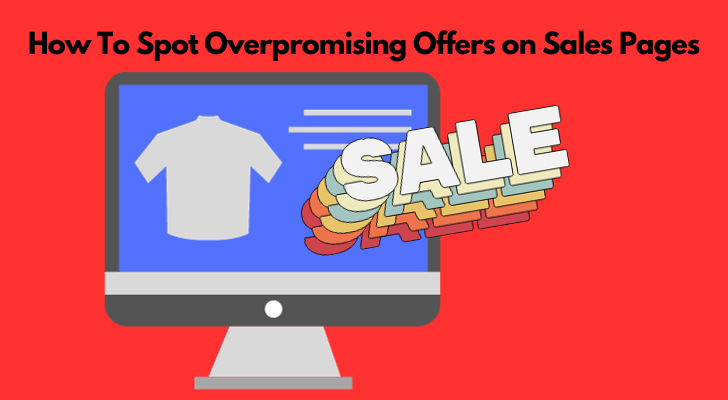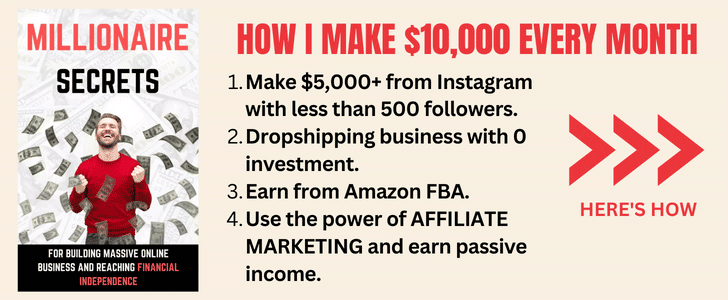Ever clicked on a deal that seemed too good to be true, only to find out later that there was a catch? Sales pages can be misleading. But fear not! By the end of this article, you'll know how to spot those sneaky overpromises and make smarter purchasing decisions.

What Kind of Products Are "Overpromising" Typically?
- Weight Loss Products: Pills, patches, teas, and even exercise equipment often claim to provide quick and substantial weight loss without much effort or dietary changes. They might use phrases like "lose weight while you sleep" or "melt fat away."
- Skincare and Beauty Products: This category includes creams that promise to eliminate wrinkles overnight, serums that claim to "reverse" aging, or products that assure instant results, such as a "10-day transformation."
- Hair Growth and Restoration Products: Solutions that promise a full head of hair in no time, especially if the person has been balding for years, often sound too good to be true.
- Health Supplements: These can include pills that claim to boost memory significantly, enhance stamina instantly, or provide other "miracle" health benefits without side effects.
- Online Money-making Schemes: Courses or tools that promise people they can "get rich quick" without much effort, investment, or experience often overpromise on their potential returns.
- Tech Gadgets: Some gadgets claim to be the "only tech device you'll ever need" or promise functionalities that seem ahead of our time.
- Self-help and Personal Development: Books or courses that guarantee personal transformation in a short amount of time can be overselling their potential impact.
- Home Cleaning Products: Items that claim to remove all stains, work for all surfaces, or clean without any effort can sometimes fall short of those grand promises.
- Automotive Add-ons: Products that assert fuel efficiency gains, performance boosts, or other enhancements just by adding a gadget or fluid to a car can often be more hype than reality.
- Investment Opportunities: Investments that assure a high return with little to no risk can be a red flag. The principle is that higher returns typically come with higher risks.
- Educational Platforms or Quick-learning Tools: Some platforms claim that users can learn a language in a month or master a skill in just a few hours.
Did You Know?
- Consumer Trust: About 65% of consumers say trust in a brand has a great deal of influence on their purchasing decision.
- Misleading Advertising: Approximately 33% of consumers have felt deceived by advertisements they perceived as misleading or overpromising.
- Return Rates: Products failing to meet promotional claims see return rates up to 50% higher than those that meet expectations.
- Word of Mouth: Negative experiences, including those involving overpromising, are shared with 15 or more people by 45% of consumers.
- Brand Loyalty: Nearly 60% of customers would likely switch brands after several experiences with misleading product descriptions or failed promises.
- Online Reviews: Over 70% of online shoppers read reviews before making a purchase, indicating the high impact of shared consumer experiences on potential overpromising.
Red Flags to Look For on Sales Pages
Ever gotten that niggling feeling when browsing a sale that something's not quite right? That’s your savvy-shopper sense tingling! Here’s a deeper dive into some common red flags on sales pages and why they should make you stop and think twice.
#1 The "Best Thing Since Sliced Bread" Syndrome
When every product or service on the page is dubbed the "best," "ultimate," or "unparalleled," your skepticism should kick in. Sure, confidence in one’s product is great, but claiming everything is the top dog? That’s stretching it. Watch out for:
- Overuse of superlatives: The more they say it, the less likely it might be true.
- Comparisons without context: Claiming to be better without saying better than what or who.
#2 Too Good To Be True Prices
If you find yourself gasping at an unbelievably low price, take a moment. Why is it so low?
- Hidden costs: That low price might not include other necessary parts or services.
- Membership or subscription traps: You might get a great deal now, but then be looped into a costly monthly fee.
#3 Pressure Cooker Countdowns

A classic tactic is the old "limited time offer" or "only a few left in stock." Sure, urgency can be a legit marketing tactic, but:
- Constant pressure: If every visit to the site shows the same countdown or low stock warning, they might just be trying to rush you.
- Refresh tricks: If refreshing the page resets the countdown or stock number, that’s a big ol’ warning sign.
#4 Vague Descriptions and Glossy Images
Details matter. If a sales page relies heavily on flashy images with little to no detailed information about the product, be cautious.
- Lack of specifications: If you're buying tech or appliances, specs are your friend. Avoid vague descriptions like "top-quality" without backup info.
- All show, no tell: A page filled only with glamorous photos and no real info? That's style without substance.
#5 Testimonials That Feel... Off
Testimonials can offer genuine insights from satisfied customers. But sometimes, they might seem a bit too perfect or lack variety.
- Identical praise: If every testimonial uses the same phrases or offers the same type of praise, it's worth being skeptical.
- Stock photos: If the customer images look a bit too polished or familiar, they might be stock photos, which casts doubt on the authenticity of the testimonial.

#6 Check the Fine Print
A sneaky tactic some sales pages employ is hiding critical information in the tiniest of prints or convoluted terms and conditions.
- Hard-to-find return policies: If it takes you more than a few clicks to find out how to return something, they might not be keen on backing up their product.
- Ambiguous terms: Words like "up to" or "as much as" can mean you're getting a lot less than you think.
#7 The Mysterious Seller
Knowing who you're buying from is as vital as knowing what you're buying.
- Lack of contact details: A legit company will make it easy for you to get in touch.
- No background info: If the "About Us" section is missing or super generic, you might want to think twice before handing over your hard-earned cash.
Did You Know?
- Social Media Influence: 40% of consumers use social media to resolve issues with products or services, where overpromising can be a frequent topic.
- Digital Ad Trust: Only 25% of internet users consider most online ads to be trustworthy, suggesting skepticism about overpromising offers.
- Consumer Protection Actions: Regulatory bodies worldwide impose millions in fines each year for misleading advertising practices.
- Customer Retention: The cost of acquiring a new customer is up to 5 times higher than retaining an existing one, emphasizing the importance of honest marketing.
Ask the Right Questions on Sales Pages
When browsing a sales page, it's kind of like going on a first date with a product. You want to know if it's a good match for you. And just like dating, the best way to find out is by asking the right questions. Ready to play detective? Okay, here we go.
What Exactly Am I Getting?
This might seem straightforward, but trust me, it's always good to double-check. Is that trendy shirt made of cotton or polyester? Is that e-course 10 hours or 10 minutes long? Details matter. Make sure you know exactly what you're getting.
Who's Behind the Product?
A shiny product is all well and good, but who's selling it? Is it a well-known brand, a small startup, or a mystery seller? A bit of background can give you confidence in your purchase. Plus, it's always cool to support small businesses when you can.
What's Their Track Record?
Past behavior can be a great indicator of future performance. Look for:
- Reviews: What are others saying about the product or the seller? A couple of bad reviews are normal, but a consistent pattern? That's a red flag.
- Ratings: They can give a quick snapshot. Just be wary if there are only five-star ratings with no genuine feedback.
Any Guarantees/Warranties?
These are like a safety net for your purchase. If there's a money-back guarantee or a solid warranty, that can be a sign of a seller's confidence in their product.
What's the Catch with Discounts?
Discounts are fab! But why is the product on sale? Is it clearance, a seasonal sale, or perhaps the product's nearing its use-by date? Always a good idea to know why you're getting a deal.
Are There Hidden Costs?
Imagine finding an amazing deal on a gadget, only to learn the charger's sold separately. Look for:
- Shipping and handling fees: Sometimes, a low product cost is offset by high shipping fees.
- Additional parts or accessories: Are there other things you'll need to buy to use the product?
What if I Change My Mind?
Ever bought something on a whim and then had second thoughts? Hey, we've all been there. Check out:
- Return policies: Can you return the product? If so, who covers the shipping?
- Exchange options: If it's not quite right, can you swap it for something else?
How Do They Handle Data and Privacy?
Online shopping means sharing some personal details. But you don't want those details ending up in the wrong hands.
- Payment Security: Are there secure methods to pay? Look for reputable payment gateways.
- Privacy policy: It might be a tad boring, but it tells you how your data is used.
Can I Reach Out for Help?
Whether it's a question about size, usage, or just a random thought, it's good to know you can get answers.
- Customer service: Is there a way to contact the company? Live chats, email support, or phone numbers show they're there for you.
- Response time: If you shoot them a question, how quickly do they get back to you?
Did You Know?
- Customer Expectation Gap: A survey found that 80% of businesses believe they provide superior customer service, while only 8% of customers agreed, reflecting a possible overpromise and underdeliver scenario.
- Influencer Marketing Missteps: With the rise of influencer marketing, about 50% of consumers feel that influencers often endorse products untruthfully, hinting at overpromising.
- Ethical Marketing Value: Brands committed to ethical marketing, including accurate product representation, enjoy up to a 20% increase in customer loyalty.
As a Seller, What Should You Do?
So you've been on the receiving end of overhyped products that don't deliver, and it's frustrating, right? Now, flip the script. As a seller, that's the last impression you want to leave. Here's how to ensure your online offers radiate authenticity.
Keep it Real with Product Descriptions
When you talk about your product, be honest.
- Be clear and transparent about what your product can and cannot do. Over-the-top claims can sound flashy, but they often raise eyebrows.
- Use high-quality images that accurately represent the product. Avoid overly edited or manipulated images that could set false expectations.
Showcase Genuine Reviews
There's a reason many of us read reviews before making a purchase. They give us a peek into other customers' experiences.
- Encourage your customers to leave reviews, be it positive or constructive feedback.
- Resist the temptation to delete negative reviews. Instead, address them professionally and offer solutions. This can demonstrate excellent customer service.
Tell Your Story

People connect with stories. Let customers know who you are and the passion behind your product.
- Share the origin story of your product or business.
- Offer insights into the process of making or sourcing your products. Maybe there's a unique craftsmanship involved or an interesting backstory.
Use Professional and Clear Website Design
First impressions matter. A tidy, clear, and professional website layout can instill trust.
- Ensure that your website is easy to navigate.
- Use clear fonts and clear images.
- Make sure your contact information is easy to find. This shows you're approachable and ready to help.
Offer Clear Pricing
Nobody likes hidden costs that suddenly pop up at checkout.
- Display prices clearly.
- If there are additional costs, like shipping or taxes, make sure they're evident early on, so customers aren't taken by surprise.
Use Secure Payment Methods
A crucial aspect of appearing genuine is ensuring customers feel safe when parting with their money.
- Opt for well-known, trusted payment gateways.
- Display security badges/certificates, letting customers know their data is protected.
Engage and Connect
Interacting with your potential customers goes a long way.
- If someone asks a question about a product, reply promptly and honestly.
- Make sure to respond to every single message to you on social media (except trolls). Answer questions, share behind-the-scenes snippets, and show appreciation for your customers.
Have a Solid Return and Refund Policy
It's natural for customers to wonder, "What if the product isn't right for me?"
- Offer a clear and fair return policy.
- Make the process of returning items as straightforward as possible.
Display Accolades and Certifications
If you've got it, flaunt it – but in a humble way, of course!
- If your product has won awards or recognitions, display them.
- Certifications, like organic, cruelty-free, or others relevant to your product, can be displayed to back up your claims.
Educate with Content
Knowledge is power, and sharing it can amplify your genuineness.
- If relevant, maintain a blog or a section where you discuss topics related to your product. This not only positions you as knowledgeable but also helps customers make informed decisions.
To wrap it up, appearing genuine in the online marketplace is about transparency, connection, and staying true to what you offer. Customers appreciate honesty and clarity. By focusing on these elements, you're not just selling a product; you're building trust. And trust, in the world of online shopping, is pure gold.
How I "Finally" Make Over $7,000 Monthly Income
"The most valuable thing I've ever done!"

